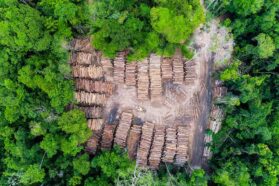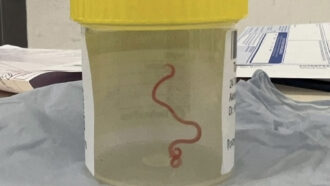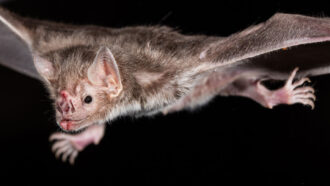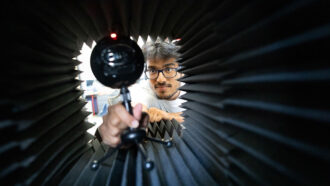All Stories
-
 Materials Science
Materials ScienceA new hydrogel could help pull drinking water from the air
The salty gel absorbs more water from the air than similar gels, even in desert climates. This could provide clean water for drinking or farming.
By Laura Allen -
 Science & Society
Science & SocietyThese teens are using science to make the world a better place
Finalists in the 2023 Thermo Fisher Scientific Junior Innovators Challenge are doing projects that aim to help others.
-
 Tech
TechMeet robots on a mission to help birds
A new generation of bird-like robots is helping people better understand and protect the wild animals that inspired them.
-
 Earth
EarthAnalyze This: Tropical forests have gotten patchier
Although many of the world's forests have gotten less fragmented since 2000, tropical forests have gotten more chopped up, putting animals at risk.
-
 Health & Medicine
Health & MedicineDoctors found a snake parasite in a woman’s brain — still alive
This worm typically infects pythons. Though this is its first known infection in humans, other types of worms also can infect the human brain.
By Meghan Rosen -
 Psychology
PsychologyThis scientist knows how to frighten you
Margee Kerr studies how and why people seek out frightening situations. She aims to use fear to help people lead happier and more empowered lives.
-
 Animals
AnimalsScientists Say: Vertebrate
Animals with spines, or vertebrates, come in all shapes and sizes.
-
 Earth
EarthTo get diamonds perfect for Barbie, make and break a supercontinent
Most pink diamonds may have formed billions of years ago during the tectonics that led to formation and breakup of Nuna, Earth’s first supercontinent.
By Nikk Ogasa -
 Brain
Brain‘Lucid’ dreamers could solve mysteries about sleeping minds
People who know they’re asleep while dreaming could help study how sleeping minds create elaborate alternate realities.
-
 Tech
TechNew tech 3-D prints ouchless COVID-19 vaccine patches
A new compact 3-D printer can produce COVID-19 vaccine patches. These are less painful than the jab and can be stored more easily than liquid vaccines.
-
 Animals
AnimalsLet’s learn about vampire bats
Vampire bats rarely bite people, instead preferring to feed on animals like cows and horses.
-
 Tech
TechTalking through a tube can trick AI into mistaking one voice for another
Researchers crafted tubes that can trick AI into mistaking one person’s voice for another’s. Bad guys could use such tricks to hack into accounts.